should用法归纳与练习had better
- 格式:doc
- 大小:14.50 KB
- 文档页数:3
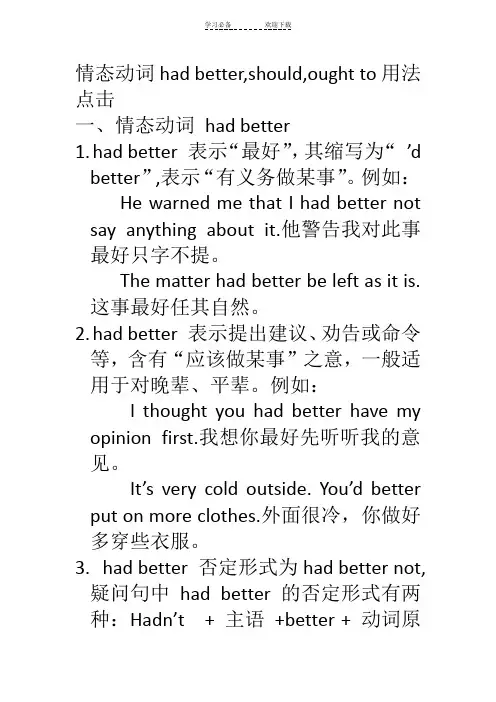
情态动词had better,should,ought to用法点击一、情态动词had better1.had better 表示“最好”,其缩写为“’d better”,表示“有义务做某事”。
例如:He warned me that I had better not say anything about it.他警告我对此事最好只字不提。
The matter had better be left as it is.这事最好任其自然。
2.had better 表示提出建议、劝告或命令等,含有“应该做某事”之意,一般适用于对晚辈、平辈。
例如:I thought you had better have my opinion first.我想你最好先听听我的意见。
It’s very cold outside. You’d better put on more clothes.外面很冷,你做好多穿些衣服。
3.had better 否定形式为had better not,疑问句中had better 的否定形式有两种:Hadn’t + 主语+better + 动词原形;Had + 主语+ better not +动词原形。
例如:Hadn’t you better go with them? 你跟他们去不是更好吗?Had we better not go? 我们不去不是更好吗?4.Had better do sth. 有时可省略为better do sth. 例如:Better stay at home and have a good rest. 最好呆在家中好好休息。
二、情态动词should, ought to1.Should 作情态动词,表示劝告、建议,多指主观上有责任、有义务做某事,作“应该”解,语气比ought to要弱。
例如:You should keep your promise.你应该履行诺言。
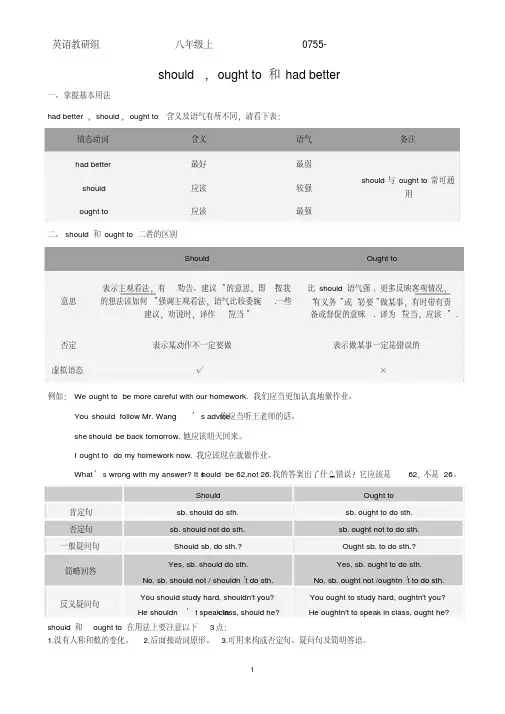
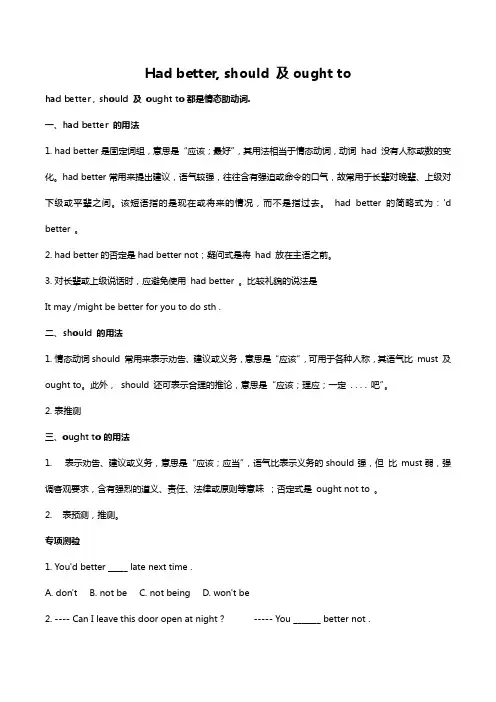
Had better, should 及ought tohad better , should 及ought to都是情态助动词.一、had better 的用法1.had better 是固定词组,意思是“应该;最好”,其用法相当于情态动词,动词had 没有人称或数的变化。
had better 常用来提出建议,语气较强,往往含有强迫或命令的口气,故常用于长辈对晚辈、上级对下级或平辈之间。
该短语指的是现在或将来的情况,而不是指过去。
had better的简略式为:'d better 。
2.had better的否定是had better not;疑问式是将had 放在主语之前。
3.对长辈或上级说话时,应避免使用had better 。
比较礼貌的说法是It may /might be better for you to do sth .二、should 的用法1.情态动词should 常用来表示劝告、建议或义务,意思是“应该”,可用于各种人称,其语气比must 及ought to。
此外,should 还可表示合理的推论,意思是“应该;理应;一定 . . . . 吧”。
2.表推测三、ought to 的用法1.表示劝告、建议或义务,意思是“应该;应当”,语气比表示义务的 should强,但比must 弱,强调客观要求,含有强烈的道义、责任、法律或原则等意味;否定式是ought not to 。
2.表预测,推测。
专项测验1.You'd better _____ late next time .A. don'tB. not beC. not beingD. won't be2.---- Can I leave this door open at night ? ----- You _______ better not .A.shouldB. wouldC. couldD. had3.----- I'm afraid I've got a bad cold . ---- _______ .A.Keep away fromB. Never mindC. You need medicineD. Better go and see a doctor4.You _____ smoke while you are walking around in the woods here. You __ start a fire .A.shouldn't ; mustB. can't ; shouldn'tC. can't ; may notD. mustn't ; could5. ---- Will you please go to the cinema with me tonight ?------Sorry ._________ , but I have some papers to finish .A.I should love itB. I should love toC. I would likeD. I had better not6.You are their teacher. You ______ care of them .A.should to takeB. might to takeC. ought to takeD. need take7.---- ______ we to make a careful plan before we start the work ?---- Oh ,no . I don't think you _____ to do that .A.Must ; needB. Need ; needC. ought ; mustD. ought ; need8.Li Ming didn't want to do that , but he _____ .A.need toB. ought toC. have toD. had to9.---- Has the train arrived ? ---- No , it ______ half an hour ago .A. ought to arriveB. ought to have arrivedC. might arriveD. might have arrived。
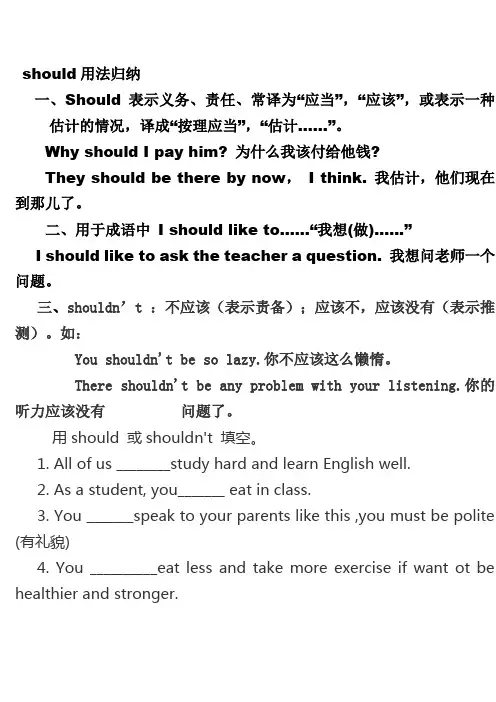
should用法归纳一、Should 表示义务、责任、常译为“应当”,“应该”,或表示一种估计的情况,译成“按理应当”,“估计......”。
Why should I pay him? 为什么我该付给他钱?They should be there by now,I think. 我估计,他们现在到那儿了。
二、用于成语中I should like to......“我想(做)......”I should like to ask the teacher a question. 我想问老师一个问题。
三、shouldn’t :不应该(表示责备);应该不,应该没有(表示推测)。
如:You shouldn't be so lazy.你不应该这么懒惰。
There shouldn't be any problem with your listening.你的听力应该没有问题了。
用should 或shouldn't 填空。
1. All of us ________study hard and learn English well.2. As a student, you_______ eat in class.3. You _______speak to your parents like this ,you must be polite (有礼貌)4. You __________eat less and take more exercise if want ot be healthier and stronger.5. My mother is very tired after work, I________ do some housework for her.had better(常简略为'd better)是一固定词组,had better"最好",用于表示对别人的劝告、建议或表示一种愿望。
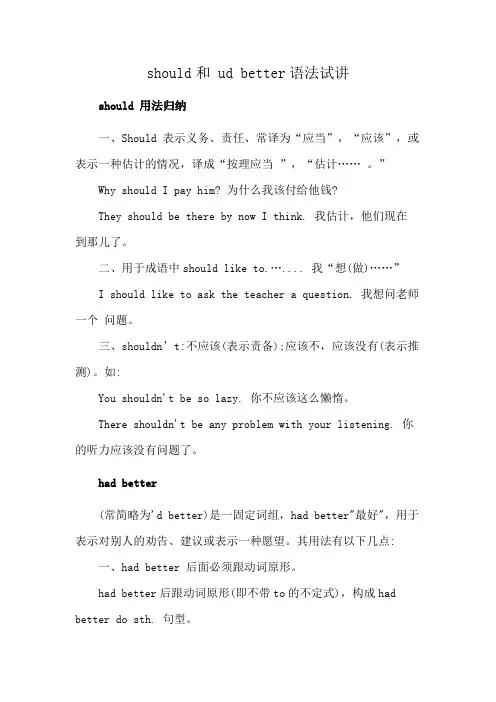
should和 ud better语法试讲should 用法归纳一、Should 表示义务、责任、常译为“应当”,“应该”,或表示一种估计的情况,译成“按理应当”,“估计…… 。
”Why should I pay him? 为什么我该付给他钱?They should be there by now I think. 我估计,他们现在到那儿了。
二、用于成语中should like to.….... 我“想(做)……”I should like to ask the teacher a question. 我想问老师一个问题。
三、shouldn’t:不应该(表示责备);应该不,应该没有(表示推测)。
如:You shouldn't be so lazy. 你不应该这么懒惰。
There shouldn't be any problem with your listening. 你的听力应该没有问题了。
had better(常简略为'd better)是一固定词组,had better"最好",用于表示对别人的劝告、建议或表示一种愿望。
其用法有以下几点:一、had better 后面必须跟动词原形。
had better后跟动词原形(即不带to的不定式),构成had better do sth. 句型。
这里的had 不能用have 来替换。
如:You'd better go to hospital at once. 你最好立即去医院看病。
Tom, you'd better go there today. 汤姆,你最好今天去那儿。
二、主语不论是第几人称,句子不论是什么时态,都要用had better的形式。
如:Now you(he,we)had better listen to the teacher. 你(他,我们)现在最好听老师讲。
三、had better的否定式。
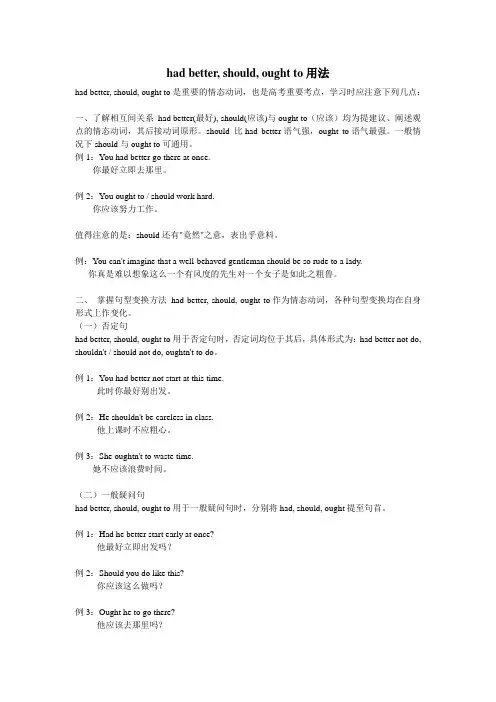
had better, should, ought to用法had better, should, ought to是重要的情态动词,也是高考重要考点,学习时应注意下列几点:一、了解相互间关系had better(最好), should(应该)与ought to(应该)均为提建议、阐述观点的情态动词,其后接动词原形。
should 比had better语气强,ought to语气最强。
一般情况下should与ought to可通用。
例1:You had better go there at once.你最好立即去那里。
例2:You ought to / should work hard.你应该努力工作。
值得注意的是:should还有"竟然"之意,表出乎意料。
例:You can't imagine that a well-behaved gentleman should be so rude to a lady.你真是难以想象这么一个有风度的先生对一个女子是如此之粗鲁。
二、掌握句型变换方法had better, should, ought to作为情态动词,各种句型变换均在自身形式上作变化。
(一)否定句had better, should, ought to用于否定句时,否定词均位于其后,具体形式为:had better not do, shouldn't / should not do, oughtn't to do。
例1:You had better not start at this time.此时你最好别出发。
例2:He shouldn't be careless in class.他上课时不应粗心。
例3:She oughtn't to waste time.她不应该浪费时间。
(二)一般疑问句had better, should, ought to用于一般疑问句时,分别将had, should, ought提至句首。
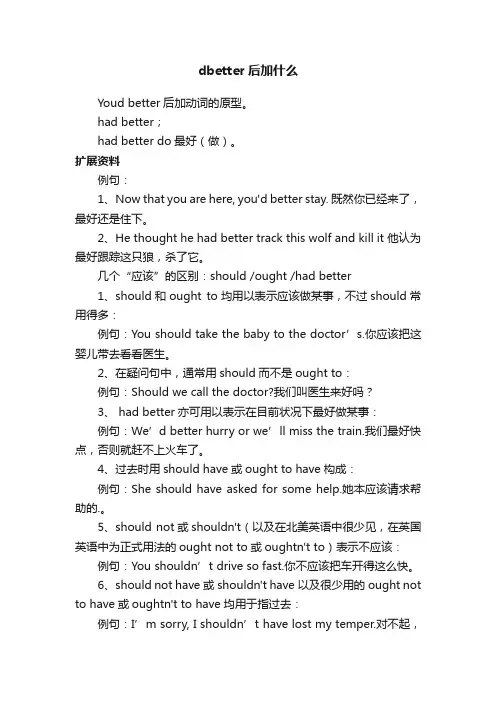
dbetter后加什么Youd better后加动词的原型。
had better;had better do最好(做)。
扩展资料例句:1、Now that you are here, you'd better stay. 既然你已经来了,最好还是住下。
2、He thought he had better track this wolf and kill it 他认为最好跟踪这只狼,杀了它。
几个“应该”的区别:should /ought /had better1、should和ought to均用以表示应该做某事,不过should常用得多:例句:You should take the baby to the doctor’s.你应该把这婴儿带去看看医生。
2、在疑问句中,通常用should而不是ought to:例句:Should we call the doctor?我们叫医生来好吗?3、 had better亦可用以表示在目前状况下最好做某事:例句:We’d better hurry or we’ll miss the train.我们最好快点,否则就赶不上火车了。
4、过去时用should have或ought to have构成:例句:She should have asked for some help.她本应该请求帮助的.。
5、should not或shouldn't(以及在北美英语中很少见,在英国英语中为正式用法的ought not to或oughtn't to)表示不应该:例句:You shouldn’t drive so fast.你不应该把车开得这么快。
6、should not have或shouldn't have以及很少用的ought not to have或oughtn't to have均用于指过去:例句:I’m sorry, I shouldn’t have lost my temper.对不起,我不该发脾气。

情态动词had better,should,ought to用法点击一、情态动词had better1.had better 表示“最好”,其缩写为“’d better”,表示“有义务做某事”。
例如:He warned me that I had better not say anything about it.他警告我对此事最好只字不提。
The matter had better be left as it is.这事最好任其自然。
2.had better 表示提出建议、劝告或命令等,含有“应该做某事”之意,一般适用于对晚辈、平辈。
例如:I thought you had better have my opinion first.我想你最好先听听我的意见。
It’s very cold outside. You’d better put on more clothes.外面很冷,你做好多穿些衣服。
3.had better 否定形式为had better not,疑问句中had better 的否定形式有两种:Hadn’t + 主语+better + 动词原形;Had + 主语+ better not +动词原形。
例如:Hadn’t you better go with them? 你跟他们去不是更好吗?Had we better not go? 我们不去不是更好吗?4.Had better do sth. 有时可省略为better do sth. 例如:Better stay at home and have a good rest. 最好呆在家中好好休息。
二、情态动词should, ought to1.Should 作情态动词,表示劝告、建议,多指主观上有责任、有义务做某事,作“应该”解,语气比ought to要弱。
例如:You should keep your promise.你应该履行诺言。
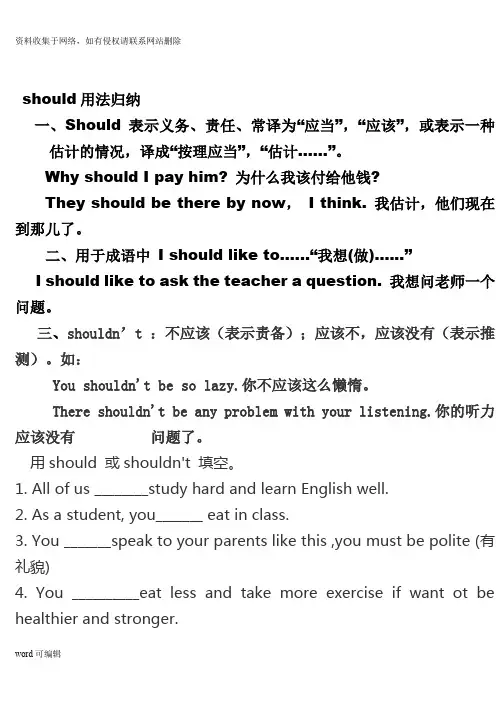
should用法归纳一、Should 表示义务、责任、常译为“应当”,“应该”,或表示一种估计的情况,译成“按理应当”,“估计......”。
Why should I pay him? 为什么我该付给他钱?They should be there by now,I think. 我估计,他们现在到那儿了。
二、用于成语中I should like to......“我想(做)......”I should like to ask the teacher a question. 我想问老师一个问题。
三、shouldn’t :不应该(表示责备);应该不,应该没有(表示推测)。
如:You shouldn't be so lazy.你不应该这么懒惰。
There shouldn't be any problem with your listening.你的听力应该没有问题了。
用should 或shouldn't 填空。
1. All of us ________study hard and learn English well.2. As a student, you_______ eat in class.3. You _______speak to your parents like this ,you must be polite (有礼貌)4. You __________eat less and take more exercise if want ot be healthier and stronger.5. My mother is very tired after work, I________ do some housework for her.had better(常简略为'd better)是一固定词组,had better"最好",用于表示对别人的劝告、建议或表示一种愿望。
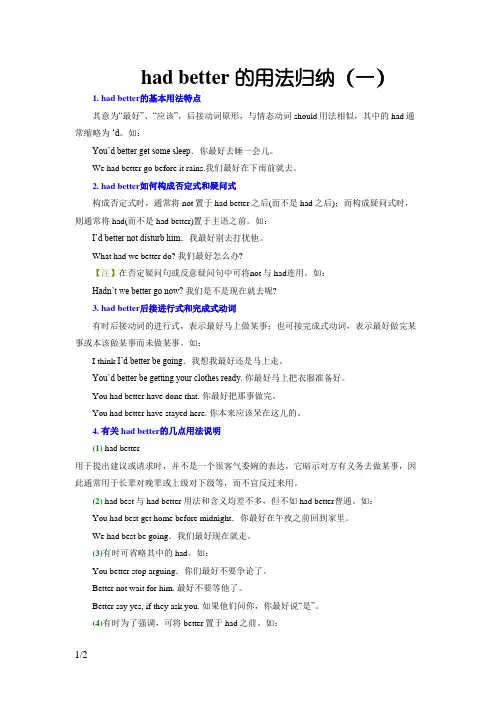
had better 的用法归纳(一)1. had better的基本用法特点其意为“最好”、“应该”,后接动词原形,与情态动词should用法相似,其中的had通常缩略为‘d。
如:You’d better get some sleep.你最好去睡一会儿。
We had better go before it rains.我们最好在下雨前就去。
2. had better如何构成否定式和疑问式构成否定式时,通常将not置于had better之后(而不是had之后);而构成疑问式时,则通常将had(而不是had better)置于主语之前。
如:I’d better not disturb him.我最好别去打扰他。
What had we better do? 我们最好怎么办?【注】在否定疑问句或反意疑问句中可将not与had连用。
如:Hadn’t we better go now? 我们是不是现在就去呢?3. had better后接进行式和完成式动词有时后接动词的进行式,表示最好马上做某事;也可接完成式动词,表示最好做完某事或本该做某事而未做某事。
如:I think I’d better be going.我想我最好还是马上走。
You’d better be getting your clothes ready. 你最好马上把衣服准备好。
You had better have done that. 你最好把那事做完。
You had better have stayed here. 你本来应该呆在这儿的。
4. 有关had better的几点用法说明(1) had better用于提出建议或请求时,并不是一个很客气委婉的表达,它暗示对方有义务去做某事,因此通常用于长辈对晚辈或上级对下级等,而不宜反过来用。
(2) had best与had better 用法和含义均差不多,但不如had better普通。
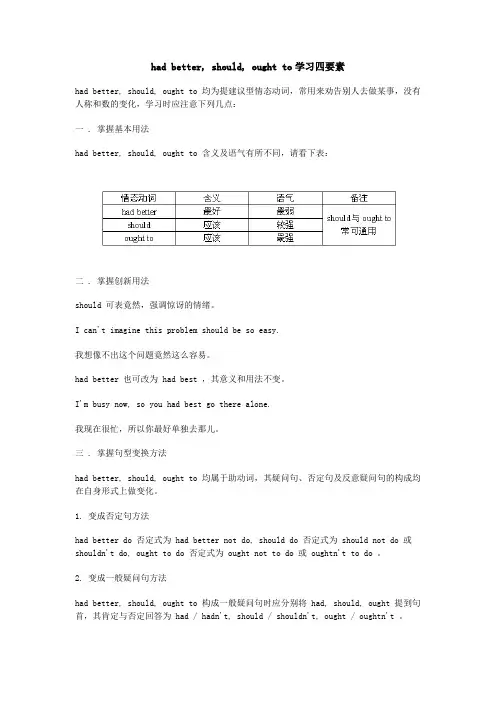
had better, should, ought to学习四要素had better, should, ought to 均为提建议型情态动词,常用来劝告别人去做某事,没有人称和数的变化,学习时应注意下列几点:一 . 掌握基本用法had better, should, ought to 含义及语气有所不同,请看下表:二 . 掌握创新用法should 可表竟然,强调惊讶的情绪。
I can't imagine this problem should be so easy.我想像不出这个问题竟然这么容易。
had better 也可改为 had best ,其意义和用法不变。
I'm busy now, so you had best go there alone.我现在很忙,所以你最好单独去那儿。
三 . 掌握句型变换方法had better, should, ought to 均属于助动词,其疑问句、否定句及反意疑问句的构成均在自身形式上做变化。
1. 变成否定句方法had better do 否定式为 had better not do, should do 否定式为 should not do 或shouldn't do, ought to do 否定式为 ought not to do 或 oughtn't to do 。
2. 变成一般疑问句方法had better, should, ought to 构成一般疑问句时应分别将 had, should, ought 提到句首,其肯定与否定回答为 had / hadn't, should / shouldn't, ought / oughtn't 。
3. 变成反意疑问句方法had better, should, ought to 构成反意疑问句时通常使用 had / hadn't, should / shouldn't, ought / oughtn't 形式。
had better , should都是情态助动词,现将它们的主要用法归纳如下:一、had better 的用法1. had better 是固定词组,意思是“应该;最好”,后接不带to 的不定式,其用法相当于情态动词,动词had 没有人称或数的变化。
had better 常用来提出建议,语气较强,往往含有强迫或命令的口气,故常用于长辈对晚辈、上级对下级或平辈之间。
该短语指的是现在或将来的情况,而不是指过去。
had better的简略式为:'d better 。
如:1) You'd better go there by bus.你最好是坐公共汽车去那里。
2) We had better start at once.我们最好立刻出发。
2. had better的否定是had better not;疑问式是将had 放在主语之前。
如:1) We'd better not tell him the news.我们最好不要告诉他这个消息。
2)Hadn't we better go to the station to meet him ?我门去车站去接他们不是更好一点吗?3. 在反意疑问句中,疑问部分一般用“had + 主语?”, 但有时也可用“Willyou ?”,表示一种请求或建议。
如:1)You'd better not go out today , had you ?今天你最好不要外出,好吗?2)I must stay at home this afternoon. You had better come to my house , will you ?我今天下午必须留在家里,你最好来我家,好吗?4. 对长辈或上级说话时,应避免使用had better 。
比较礼貌的说法是It may / might be better for you to do sth .。
需要”need 的用法一、作情态动词1.need作情态动词无人称或数的变化,后接动词原形,多用于否定句和疑问句中。
如:You needn't worry.你不必担心。
2.由need引出的一般疑问句,肯定回答常用must或have to;否定答语常用needn't. 如:—Need I answer the question? 我需要回答那个问题吗?—Yes, you must. /Yes, you have to.是的,你必须回答。
/是的,你得回答。
/No, you needn't.不,不必了。
3.由must引出的一般疑问句,肯定回答用must,否定答语用needn't或don't have to。
如:—Must I do the work now? 我必须现在干这个活吗?—Yes, you must /have to.是的,你必须做。
/No, you needn't /don't have to. 不,你现在不必做。
二、作行为动词need 作为行为动词有人称和数的变化,后面可接名词、代词、动名词及带to 的动词不定式;可用于肯定句、疑问句和否定句中,如:She needs help.她需要帮助。
I don't need to see the doctor.我不需要看病。
—Do you need to go at once? 你需要马上走吗?—Yes, I do.是的,我得马上去。
—No, I don't.不,不用马上走。
Used to “过去常常”的用法一、used to+动词原形:(表过去的习惯),常译为“过去常常”或“过去总是”。
在这个结构中,used是一个不及物动词,to是不定式符号。
它后面只能跟动词原形,不能跟名词、代词或动名词。
例如:They used to be good friends.他们过去是好朋友。
She often used to say so.她过去总是这么说。
had better的具体用法“had better”是一个很常见的英语短语,它表示某人应该做某事,否则将有不好的后果。
在正式的场合,“had better”也可以用于提醒他人注意某个重要问题,增加人与人之间的沟通良性互动。
下面,我们将详细介绍“had better”的具体用法。
1. 一般构成“had better”是一种情态动词,用来表示建议或警告,因此其形式是“had better”或“had better not” 。
例如,“You had better finish your homework before you go out.”(你最好在出门前完成你的家庭作业)。
在这句话中,形式主语是“you”,谓语动词是“had”,而“better”则表示做某事更好。
2. 句型结构使用“had better”时,句子中最好包括“should”和“ought to”等其他情态动词。
例如,“You had better go to the hospital. You should take good care of yourself.”(你最好去医院。
你应该好好保重自己。
)这种语言用法更容易传达出建议或警告的含义。
3. 接“not”的情况在表示警告含义时,可以在“had better”后添加“not”“had better not”。
例如,“You had better not drive after drinking.”(喝酒后最好不要开车。
)这种用法是为了表达出一些应该避免的错误行为,并且形态上也更加明确。
4. 动词形式在“had better”后跟动词时,要使用动词的原形。
例如,“You had better study harder.”(你最好努力学习。
)而不是“studied”或“studying”。
5. 翻译在翻译“had better”时,不需要逐字对译,只需把它们整体翻译成相应的意思即可。
限时练习:40min完成时间:月日天气:作业06 情态动词should、ought to和had better的用法【要点回顾一】should 的用法Should为情态动词,意为“应该”,后接动词原形,其否定形式为,变为一般疑问句时,should 提到句首。
无人称和数的变化。
其用法如下:(1)表示委婉地提出意见或建议时,意为“应该,应当”。
You should brush your teeth before you go to bed.(2)表示义务,责任时,意为“应该,应当”。
You should help your mother with your housework.(3)表示命令或要求时,语气比较强烈。
You shouldn’t go out at night.【要点拓展】Ought to也可以表示劝告、建议,意为“应该”。
一般情况下,ought to 可以和should 通用,但是ought to 语气更强烈一些。
ought to 的否定式是:My parents are getting older and older. I ought to/ should visit them more often.【要点回顾二】had better 的用法had better 是一个固定短语,意为“最好”,用于表示对别人的劝告、建议或表示一种愿望。
其用法有以下几点:1.had better 后面必须跟动词。
had better 后跟动词原形(即不带to的不定式),构成短语,had不能用have来替换。
You’d better go to hospital at once.Tom, you’d better go there today.2.主语无论是第几人称,无论用什么时态,都要用had better的形式。
Now you/ he/ we had better listen to the teacher.3.had better的否定式:常用的否定形式是将not直接放在had better的后面,即.You had better not miss the last bus.一、单项选择1.You’d better ________ any noise at night.A.make B.to make C.not make D.not to make2.(2022上·广东广州·八年级执信中学校考期末)—You made a mistake. The spelling ________ be “friend”, not “fried”.—Oh, I see. Thanks.A.could B.can C.may D.should3.(2022上·广东广州·八年级广东番禺中学校考期末)You ________ loudly in the library, or you will bother other readers.A.ought not speak B.ought not to speak C.not ought to speak D.ought not speaking4.I think _________ a new dance is not easy. You should _________ it often.A.to learn; to practise B.learning; practice C.learn; practising D.learns; to practise 5.(2023·湖北黄石·统考中考真题)Young Chinese people ________ keep the motherland at heart, aim high, and have their feet firmly on the ground.A.should B.can C.may D.need6.(2023·内蒙古呼和浩特·统考中考真题)In most museums, there is no shouting and no running, and you________ touch anything.A.couldn’t B.can’t C.needn’t D.mustn’t7.(2023·江苏南通·统考中考真题)If a football team wants to enter the World Cup, it ________ become a member of FIFA first.A.may B.must C.can D.might8.(2023·江苏镇江·统考中考真题)The new app about fashion is really free and you ________ pay money for it.A.may B.must C.shouldn’t D.needn’t9.—Mom, could I go out with my friend for dinner?—Certainly, but you ________ finish your homework first.A.can B.could C.may D.should10.You ________ smoke in the office. It’s bad for the health of all the peopl e here.A.should B.had better C.needn’t D.shouldn’t一、完形填空(2022~2023上·广东广州·八年级增城中学校考期末)Do you think hard work always pays off? Here is the story about how I became successful. I’m very smart and I have spent 10 years 11 mechanics (机械学) but I have low education. I always tried my best to make people trust me but failed. I started this year having another factory job with a little 12 pay than my last one. I was making $ 13.50 an hour at my last job and had a hard time living. Though I was paid more, I still lived 13 . However, if you kept on and didn’t run away, you would succeed one day.Three months ago, my neighbor bought a used car. Everyone thought it had some 14 problems and had no idea. After taking a look at it, I said that I would be able to repair it if he could pay me $ 2,000. At last, he was very cheerful at my 15 and told many of his friends I really made it.In about two months more people came to me for working and I was making great 16 . Then one of my customers (顾客) 17 me with another good job that started even higher. It was 18 because I was able to let them believe in me by solving difficult problems. I finally 19 my new life.So everyone, remember not to give up your dream easily because 20 will come to you in the end with your hard work.11.A.learning B.selling C.stealing D.spelling12.A.less B.better C.longer D.smaller13.A.quickly B.warmly C.badly D.happily14.A.famous B.usual C.easy D.huge15.A.words B.smile C.work D.tools16.A.money B.art C.time D.food17.A.mixed B.filled C.compared D.provided18.A.expensive B.educational C.fantastic D.traditional19.A.created B.lost C.shared D.hurt20.A.excitement B.success C.love D.truth二、阅读理解(2022上·广东广州·八年级广州中学校考期末)Do you admire successful people? Do you think they had their success easily? As “Father of Hybrid Rice”, Yuan Longping got over great difficulties and spent his whole life working to reduce world hunger and helping to feed the country with the largest population.Wu Mengchao, the “Father of Chinese Hepatobiliary Surgery”, focused on saving people’s lives for nearly eighty years. He performed more than 16,000 operations (手术) during his life. Holding the knife for such a long time deformed his fingers. Wu once said, “It would be my greatest happiness if I could work at the operating table until my dying day.”In 1969, in order to solve the problem of treating malaria (疟疾), Tu Youyou, a pharmacologist (药学家) took on the job as head of a research team. She and her teammates performed different kinds of experiments. However, the results were disappointing. Instead of giving up, in 1972, they made it! In 2015, she received Nobel Prize.Thomas Edison, the inventor of the light bulb, believed that every failure was a step towards success. He once said, “If I find 10,000 ways something won’t work, I haven’t failed. I am not discouraged, because every wrong try is another step forward.”Sometimes, their success was a surprise, even to themselv es. The famous scientist Alexander Fleming said, “I certainly didn’t plan to revolutionize (变革) all medicine by discovering the world’s first antibiotic (抗生素). But I guess that was exactly what I did.”Some people only became successful after their deaths. Not like Pablo Picasso who became famous and very rich during his lifetime, the artist Vincent V an Gogh only sold one painting all through his life and that was to a friend. But he kept painting and he painted more than 2, 000 artworks in the following ten years. Now his paintings are very popular and they sell for millions of pounds.One thing all these people have in common is sticking to their goals no matter what.21.What do Yuan Longping and Wu Mengchao have in common?A.They succeeded in solving world problems.B.They achieved a lot in the medical field.C.They spent all their lives serving people.D.They are remembered for their happiness.22.Which of the following statements is TRUE?A.Pablo Picasso became famous after his death.B.Vincent Van Gogh painted 2, 001 artworks in his life.C.Thomas Edison tried 10, 000 ways before he invented the light bulb.D.It took Tu Youyou’s team about 3 years to reach their goal.23.How did Alexander Fleming feel about his discovery of the first antibiotic?A.He did n’t fully realize its importance.B.He didn’t plan to study all medicine.C.He knew exactly what his success meant.D.He felt too tired to stay awake.24.What does the writer mainly want to tell us?A.Not everyone can be successful.B.Great achievements ar en’t made naturally.C.The more difficulties, the better.D.Great hopes make great men.三、语法填空(2022~2023上·广东深圳·八年级统考期末)阅读下面短文,在空格处填入一个适当的词或使用括号中词语的正确形式填空。
had better的用法had better的用法had better是英语中一个常见的短语,通常用于给出建议或警告。
它的使用非常灵活,可以用在各种不同的情境中。
下面将详细介绍had better的用法。
一、基本概述had better是一个模态动词短语,表示“最好”、“应该”、“最好不要”等含义。
它通常后面跟着一个动词原形,用于表达建议或警告。
例如:- You had better hurry up if you want to catch the train.(如果你想赶上火车,最好赶快。
)- He had better not forget his passport if he wants to travel abroad.(如果他想出国旅行,最好不要忘记他的护照。
)- We had better start preparing for the exam now.(我们最好现在开始准备考试。
)二、肯定句和否定句1. 肯定句在肯定句中,had better后面跟动词原形。
例如:- You had better get some rest.(你最好休息一下。
)- We had better finish this project by Friday.(我们最好在周五之前完成这个项目。
)2. 否定句在否定句中,had better后面跟not和动词原形。
例如:- You had better not eat too much junk food.(你最好不要吃太多垃圾食品。
)- We had better not be late for the meeting.(我们最好不要迟到会议。
)三、疑问句在疑问句中,had better通常放在句首,后面跟主语和动词原形。
例如:- Hadn''t we better leave now?(我们现在最好离开吗?)- Hadn''t you better call your parents and let them know you''re okay?(你最好给你的父母打电话告诉他们你很好吗?)四、与should的区别had better和should都可以用于表达建议,但它们有一些区别。
should用法归纳
一、Should表示义务、责任、常译为“应当”,“应该”,或表示一种
估计的情况,译成“按理应当”,“估计......”。
WhyshouldIpayhim为什么我该付给他钱
Theyshouldbetherebynow,Ithink.我估计,他们现在到那儿了。
二、用于成语中Ishouldliketo......“我想(做)......”
Ishouldliketoasktheteacheraquestion.我想问老师一个问题。
三、shouldn’t:不应该(表示责备);应该不,应该没有(表示推测)。
如:
Youshouldn'tbesolazy.你不应该这么懒惰。
Thereshouldn'tbeanyproblemwithyourlistening.你的听力应该没有问题了。
用should或shouldn't填空。
1.Allofus________studyhardandlearnEnglishwell.
2.Asastudent,you_______eatinclass.
3.You_______speaktoyourparentslikethis,youmustbepolite(有礼貌)
4.You__________eatlessandtakemoreexerciseifwantotbehealthiera ndstronger.
5.Mymotherisverytiredafterwork,I________dosomehouseworkfor her.
hadbetter(常简略为'dbetter)是一固定词组,hadbetter"最好",用于表示对别人的劝告、建议或表示一种愿望。
其用法有以下几点:
一、hadbetter后面必须跟动词原形。
hadbetter后跟动词原形(即不带to的不定式),构成hadbetterdosth.句型。
这里的had不能用have来替换。
如:
You'dbettergotohospitalatonce.你最好立即去医院看病。
Tom,you'dbettergotheretoday.汤姆,你最好今天去那儿。
二、主语不论是第几人称,句子不论是什么时态,都要用hadbetter 的形式。
如:
Nowyou(he,we)hadbetterlistentotheteacher.你(他,我们)现在最好听老师讲。
三、hadbetter的否定式。
如:
常用的否定形式是将否定副词not直接放在hadbetter的后面。
如:Youhadbetternotmissthelastbus.你最好不要错过末班公共汽车。
YouhadbetternotleaveforNanjingthedayaftertomorrow.你最好后天不要动身去南京。
注意:否定副词not绝不能放在had的后面。
如:不能说:Youhadn'tbettergo.而应该说:Youhadbetternotgo.
四、在祈使句中,had有时可以省略。
如:
Betternotdoit.最好别做那事。
Betternotwaitforthem.最好不要等他们。
五、hadbetter在表示对别人劝告、建议时,不宜用于与陌生人、长辈及上级的交谈中。
对长辈说话时,最好不用hadbetter。
比较有礼貌的说法是:Itmightbebetterforyou...;
Itwouldbebetterforyou...。
如:
Itmightbebetterforyoutohelpme,Grandpa.爷爷,您最好能帮我一下。
[练习]
下列各句都有一处错误,请改正。
1.You'dbettertowaitformeattheschoolgate.
2.Ihavebetterwritetohimnow.
3.Youhadnotbettergothere.。